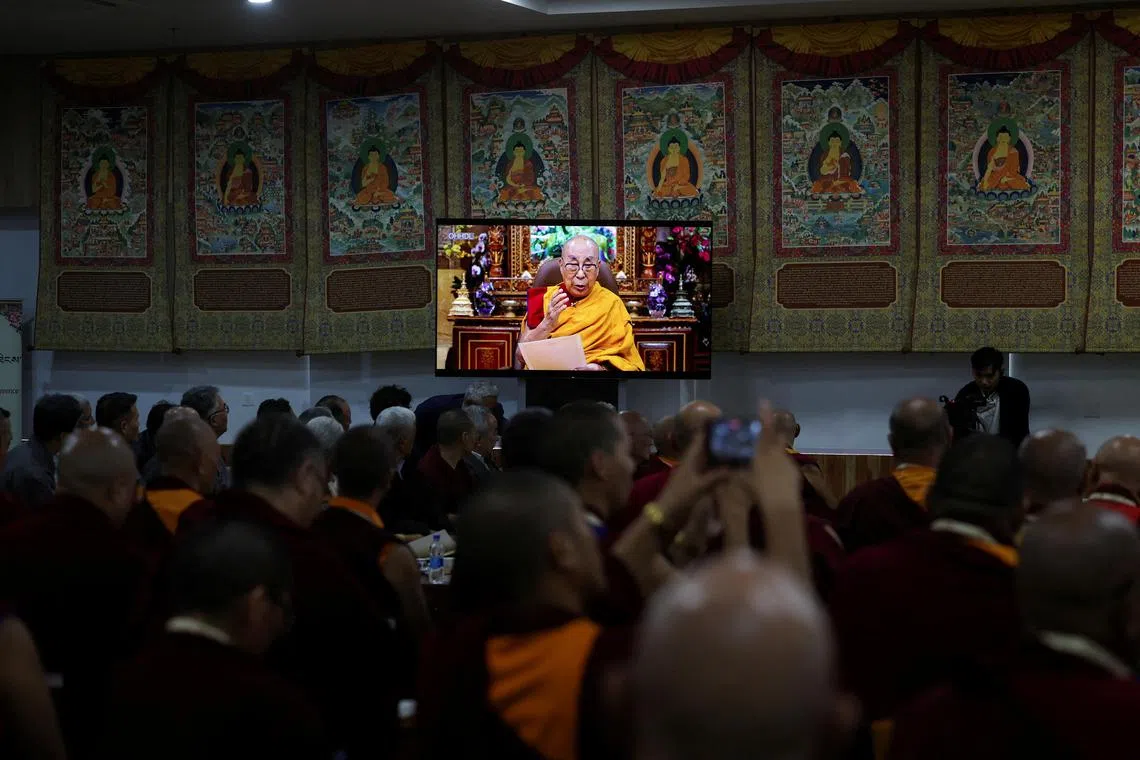Dalai Lama says he will have successor after his death
Sign up now: Get insights on Asia's fast-moving developments

The Dalai Lama, Tibet's spiritual leader, speaks in a video broadcast at the start of a meeting of religious leaders on July 2.
PHOTO: REUTERS
DHARAMSHALA, India – The exiled spiritual leader of Tibet confirmed on July 2 that he will have a successor when he dies, reassuring Buddhist followers around the globe that the 600-year-old institution of the Dalai Lama will continue.
It is a landmark decision not only for Tibetans, but also for global supporters who see the Dalai Lama as a symbol of non-violence, compassion and the enduring struggle for Tibetan cultural identity under Chinese rule.
According to Tibetans, Tenzin Gyatso is the 14th reincarnation of the Dalai Lama. His statement was released ahead of his 90th birthday on July 6.
The Dalai Lama is lauded by his followers for his tireless campaign for greater autonomy for Tibet, a vast high-altitude plateau in China about the size of South Africa.
He and thousands of other Tibetans have lived in exile in India since Chinese troops crushed an uprising in the Tibetan capital Lhasa in 1959.
The charismatic Nobel Peace Prize-winning Buddhist had previously said the institution of the Dalai Lama would continue only if there was popular demand.
He said on July 2 he received multiple appeals over the past 14 years from Tibetan diaspora in exile, Buddhists from across the Himalayan region, Mongolia, and parts of Russia and China, “earnestly requesting that the institution of the Dalai Lama continue”.
“In particular, I have received messages through various channels from Tibetans in Tibet making the same appeal,” he said in a video broadcast at the start of a meeting of religious leaders in the Indian Himalayan town where he has lived for decades.
“In accordance with all these requests, I am affirming that the institution of the Dalai Lama will continue,” he added, according to an official translation.
China responded by insisting that the reincarnation of the Dalai Lama “must be approved by the central government”.
“The reincarnation of the Dalai Lama, the Panchen Lama and other great Buddhist figures must be chosen by drawing lots from a golden urn, and approved by the central government,” Foreign Ministry spokeswoman Mao Ning said at a regular news briefing, referring to a method introduced by a Qing dynasty emperor in the 18th century.
“The Chinese government implements a policy of freedom of religious belief, but there are regulations on religious affairs and methods for managing the reincarnation of Tibetan living Buddhas,” Ms Mao said.
‘Historic’
While China condemns him as a rebel and separatist, the internationally recognised Dalai Lama describes himself as a “simple Buddhist monk”.
Many exiled Tibetans fear China will name his successor to bolster control over a territory it poured troops into in 1950.
But the Dalai Lama said on July 2 that responsibility for identifying the 15th Dalai Lama “will rest exclusively” with the India-based Gaden Phodrang Trust, the office of the Dalai Lama.
“I hereby reiterate that the Gaden Phodrang Trust has sole authority to recognise the future reincarnation; no one else has any such authority to interfere in this matter,” he added.
Ms Chemi Lhamo, 30, a Tibetan activist in exile, said she was convinced the continuation of the role of Dalai Lama would serve the cause of all Tibetans.
“There isn’t a doubt that the Dalai Lama institution will also continue to serve the benefit of humanity,” Ms Lhamo said, adding the announcement sent a message to Beijing “unequivocally” rejecting its role in identifying the future leader.
The Dalai Lama handed over political authority in 2011 to an exiled government chosen democratically by 130,000 Tibetans globally.
At the same time, he warned that the future of his spiritual post faced an “obvious risk of vested political interests misusing the reincarnation system”. AFP


